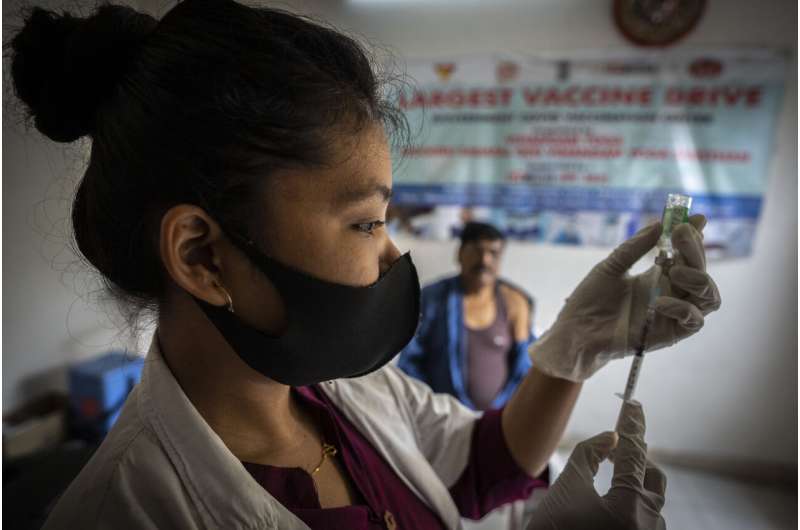
India began offering booster doses of COVID-19 vaccine to all adults on Sunday but limited free shots at government centers to front-line workers and people over age 60.
The doses, which India is calling a “precautionary” shot instead of a booster, are available to people nine months after they receive their second jab, the Health Ministry said in a statement Friday. Those outside the two priority categories will need to pay for the shots at privately run facilities, the ministry said.
Unlike other countries, where many people receive a different vaccine as a booster, most Indians have received the same type—in most cases the AstraZeneca vaccine produced by India’s Serum Institute, the world’s largest vaccine maker. It accounts for nearly 90% of all doses that have been administered in India, even though emergency approvals have been given for eight vaccines.
On Saturday, the Serum Institute of India said it has cut the price of its AstraZeneca vaccine from $7.90 a dose to $2.96 for private hospitals.
India has so far vaccinated about 96% of those aged 15 years and older with at least one COVID-19 vaccine dose, while about 83% have received both shots, according to official data.
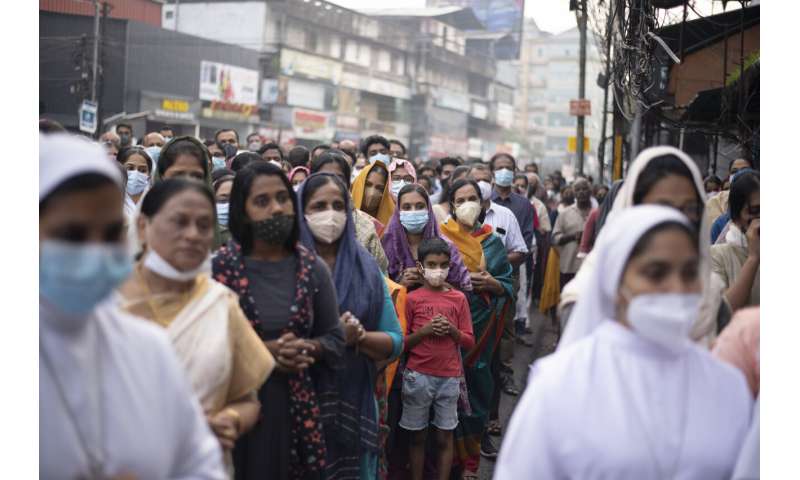 Indian Christians wearing masks as a precaution against COVID-19 gather for prayers as they observe Palm Sunday in Kochi, Kerala state, India, Sunday, April 10, 2022. The South Asian country has recorded a steep dip in coronavirus cases in recent weeks, with the health ministry reporting approximately 1,100 cases on Friday. Credit: AP Photo/R S Iyer
Indian Christians wearing masks as a precaution against COVID-19 gather for prayers as they observe Palm Sunday in Kochi, Kerala state, India, Sunday, April 10, 2022. The South Asian country has recorded a steep dip in coronavirus cases in recent weeks, with the health ministry reporting approximately 1,100 cases on Friday. Credit: AP Photo/R S Iyer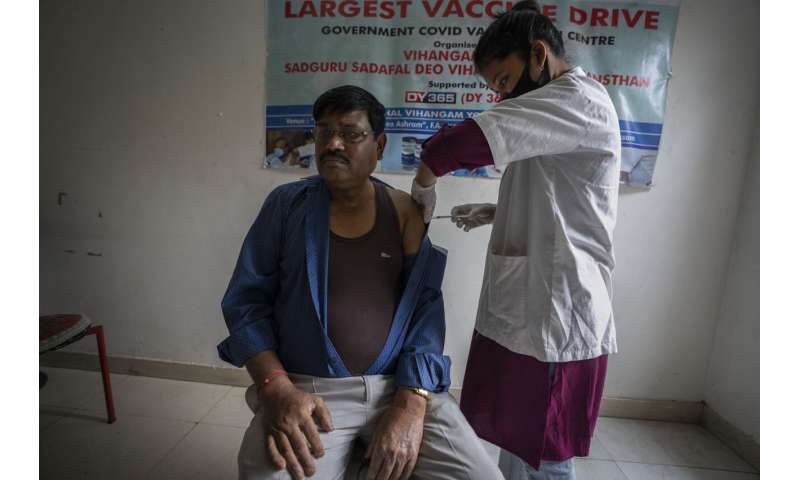 A man receives his third dose of vaccine for COVID-19 at a private vaccination center in Gauhati, India, Sunday, April 10, 2022. India began offering booster doses of COVID-19 vaccine to all adults on Sunday but limited free shots at government centers to front-line workers and people over age 60. Credit: AP Photo/Anupam Nath
A man receives his third dose of vaccine for COVID-19 at a private vaccination center in Gauhati, India, Sunday, April 10, 2022. India began offering booster doses of COVID-19 vaccine to all adults on Sunday but limited free shots at government centers to front-line workers and people over age 60. Credit: AP Photo/Anupam Nath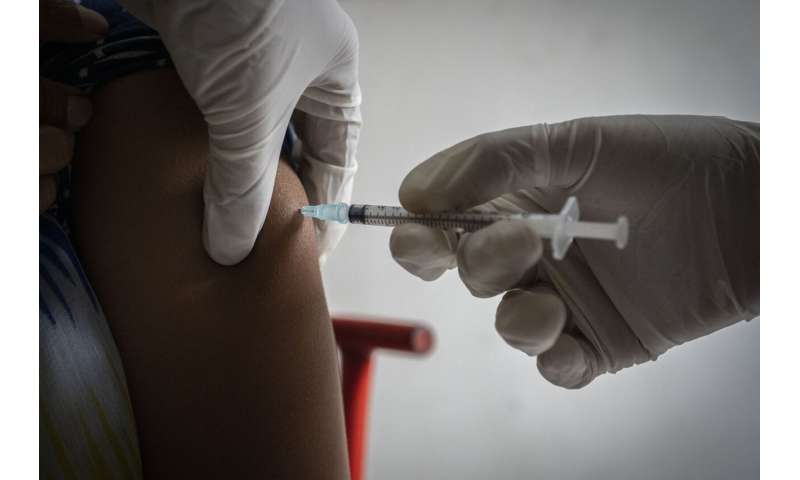 A woman receives her third dose of vaccine for COVID-19 at a private vaccination center in Gauhati, India, Sunday, April 10, 2022. India began offering booster doses of COVID-19 vaccine to all adults on Sunday but limited free shots at government centers to front-line workers and people over age 60. Credit: AP Photo/Anupam Nath
A woman receives her third dose of vaccine for COVID-19 at a private vaccination center in Gauhati, India, Sunday, April 10, 2022. India began offering booster doses of COVID-19 vaccine to all adults on Sunday but limited free shots at government centers to front-line workers and people over age 60. Credit: AP Photo/Anupam Nath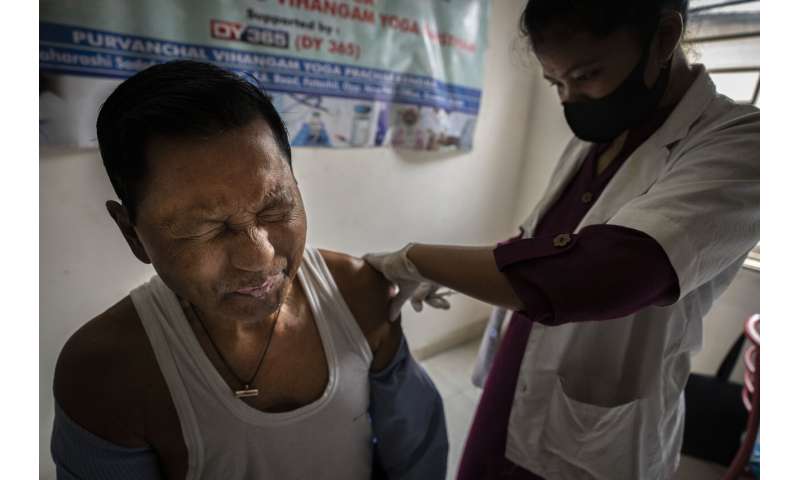 A man reacts as he receives his third dose of vaccine for COVID-19 at a private vaccination center in Gauhati, India, Sunday, April 10, 2022. India began offering booster doses of COVID-19 vaccine to all adults on Sunday but limited free shots at government centers to front-line workers and people over age 60. Credit: AP Photo/Anupam Nath
A man reacts as he receives his third dose of vaccine for COVID-19 at a private vaccination center in Gauhati, India, Sunday, April 10, 2022. India began offering booster doses of COVID-19 vaccine to all adults on Sunday but limited free shots at government centers to front-line workers and people over age 60. Credit: AP Photo/Anupam Nath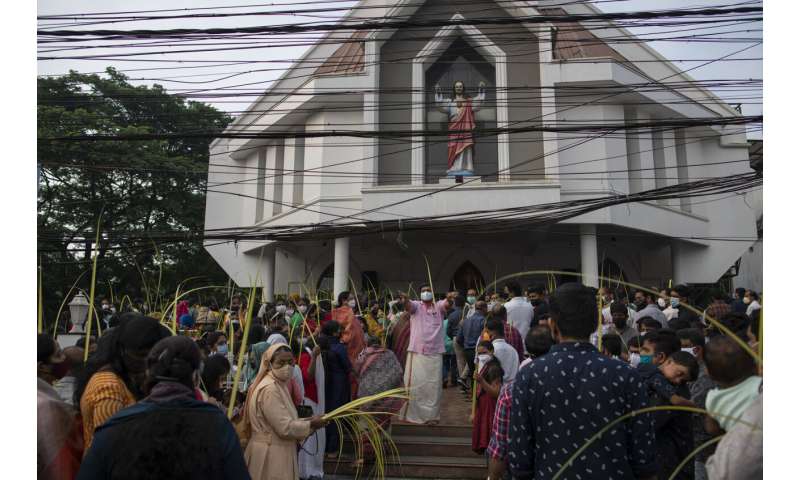 A man, center, wearing mask as a precaution against COVID-19 gestures to devotees to make way for an arriving procession as Christians observe Palm Sunday outside a Church in Kochi, Kerala state, India, Sunday, April 10, 2022. The South Asian country has recorded a steep dip in coronavirus cases in recent weeks, with the health ministry reporting approximately 1,100 cases on Friday. Credit: AP Photo/R S Iyer
A man, center, wearing mask as a precaution against COVID-19 gestures to devotees to make way for an arriving procession as Christians observe Palm Sunday outside a Church in Kochi, Kerala state, India, Sunday, April 10, 2022. The South Asian country has recorded a steep dip in coronavirus cases in recent weeks, with the health ministry reporting approximately 1,100 cases on Friday. Credit: AP Photo/R S Iyer Indian Christians wearing masks as a precaution against COVID-19 gather for prayers as they observe Palm Sunday in Kochi, Kerala state, India, Sunday, April 10, 2022. The South Asian country has recorded a steep dip in coronavirus cases in recent weeks, with the health ministry reporting approximately 1,100 cases on Friday. Credit: AP Photo/R S Iyer
Indian Christians wearing masks as a precaution against COVID-19 gather for prayers as they observe Palm Sunday in Kochi, Kerala state, India, Sunday, April 10, 2022. The South Asian country has recorded a steep dip in coronavirus cases in recent weeks, with the health ministry reporting approximately 1,100 cases on Friday. Credit: AP Photo/R S Iyer A man receives his third dose of vaccine for COVID-19 at a private vaccination center in Gauhati, India, Sunday, April 10, 2022. India began offering booster doses of COVID-19 vaccine to all adults on Sunday but limited free shots at government centers to front-line workers and people over age 60. Credit: AP Photo/Anupam Nath
A man receives his third dose of vaccine for COVID-19 at a private vaccination center in Gauhati, India, Sunday, April 10, 2022. India began offering booster doses of COVID-19 vaccine to all adults on Sunday but limited free shots at government centers to front-line workers and people over age 60. Credit: AP Photo/Anupam Nath
India’s booster program started in January when healthcare and front-line workers along with people over age 60 with health problems were allowed to receive shots.
India has recorded a steep decline in coronavirus cases in recent weeks, with the Health Ministry reporting 1,054 cases in the latest 24 hours.

